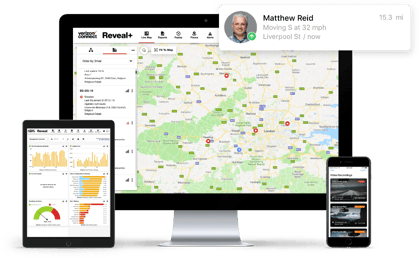9 Secrets to Reducing your Fleet Expenses
As a fleet owner, your day-to-day costs can quickly add up. What you don’t know is there are further hidden, expensive...
Read more
After years of debate and uncertainty, fleet-reliant businesses are gradually adapting to life outside the EU.
The impact of this new environment will differ from business to business. Some may need to drive productivity to meet demand, while others may need to streamline processes and cut down on paperwork.
Whatever it means for your business, a comprehensive fleet management solution can help you adapt to your new environment. As well as helping drive efficiency, safety and security, such a system can also help you get ready for further changes to life in the post-Brexit United Kingdom.
Here’s how:
While by no means a permanent fixture, delays have been reported at UK ports and border crossings in the months following the country’s exit from the European Union. But whether Brexit-related or not, delays can play havoc with scheduling, dispatch and customer satisfaction.
With a comprehensive fleet management solution in place, you can mitigate delays in several ways.
Smart scheduling algorithms plot a day’s stops in the most efficient order, accounting for numerous factors, including road and traffic conditions. This can help you reduce incremental delays, allowing you to reroute vehicles around areas of congestion where possible.
Live location information also allows you to see exactly where each driver is at any given time, as well as the time they are expected to arrive at their destination. With this information, you can update your customers proactively should a vehicle look likely to arrive late.
Increasing levels of admin have been reported by businesses trading with the EU, across a wide range of industries.
Not only is excess paperwork an inconvenience, but it can also take up valuable man-hours, impact your ability to meet SLAs and result in additional costs.
Whether you’re selling fish to Frankfurt or bricks to Brussels, there are many benefits to reducing your administrative burden. And fleet management technology can help in this regard.
With key processes such as timesheets, payroll and job completion automated, your field workers spend more time on the job and less time at the desk. Information such as site reports and customer signatures can be collected digitally, saving both time and effort.
And, when you add a digital tachograph solution to the mix, tacho data can be downloaded remotely and automatically. So, your office staff have one less thing to worry about.
Any changes to business practices can have a knock-on effect on costs. This could be due to uncertainty impacting fuel prices, additional paperwork requiring extra staff, or delays and detours resulting in increased fuel consumption.
Whatever the case, fleet management technology can help you keep costs under control. Automating the time-consuming processes listed above can help to lower both staff and equipment costs. Optimised routing can also reduce excess mileage, decreasing both fuel consumption and wear and tear.
Easy analysis and reporting of fleet data can help you reduce outgoings too. For example, by monitoring instances of idling across your fleet, you can score drivers on their performance.
These scorecards can be used to rank drivers against each other and coach more economical driving styles. Drivers that rank well can be rewarded with others incentivised to improve.
Reveal has made a lot of people’s jobs easier. Our office staff spend less time chasing drivers. We know exactly where our fleet is at any given time, and we’ve been able to drive down fuel costs.
See how Verizon Connect helped a Wales-based courier company save £125 per day
Any kind of change can be disruptive. Changing regulation can lead to additional forms and compliance criteria. All of which puts additional steps in a driver’s day, leading to delays and potential dissatisfaction.
In industries where time is already tight and driver workloads are high, fleet-reliant businesses must do all they can to mitigate any disruption.
Fleet management technology can help you do just that. Automation helps to free up drivers’ time across the board. It removes the need to report detours or changes to ETAs manually and eradicates all manner of paperwork.
Creating a central portal for your business information such as forms, policies, quotes, and customer notes also gives drivers easy access to the information they need as soon as they need it. Handling all job processes digitally – from quote to invoice to job completion – in this way also creates a digital paper trail.
The long-term impacts of Brexit on fleet-reliant businesses are yet to be seen. We are only a few months outside the EU. Over time, regulation, processes and systems will evolve.
While we may not know what to expect, fleet management technology can help you prepare for it.
By driving efficiency and productivity, you can be sure that your operation is lean and agile enough to adapt, come what may. Closely monitoring your vehicles and assets over time also allows you to spot trends and focus resource where it’s needed now, not yesterday.
Most of all, a comprehensive fleet management solution gives you total visibility of your operation – allowing you to make faster and better-informed business decisions. And that can only help you and your fleet navigate a changing landscape.
The impact of Brexit on your business is largely out of your control. However, there are plenty of steps that can be taken to help you adapt to life outside the EU – and stay prepared for further changes to your working environment.
Want to know more? See how Verizon Connect helps the haulage industry drive efficiency, control costs, and meet customer demands.
Or, to see our suite of applications in action for yourself, request a free demo today.
Tags: All




Find out how our platform gives you the visibility you need to get more done.
As a fleet owner, your day-to-day costs can quickly add up. What you don’t know is there are further hidden, expensive...
Read moreVerizon Connect Reveal tracks the fleet data that can have a big impact on your business. These are things like where...
Read moreAt Verizon Connect, we can only provide the highest possible level of service to fleet managers and business owners by...
Read moreReveal tracks the fleet data that can have a big impact on your business. These are things like where your vehicles are...
Read more